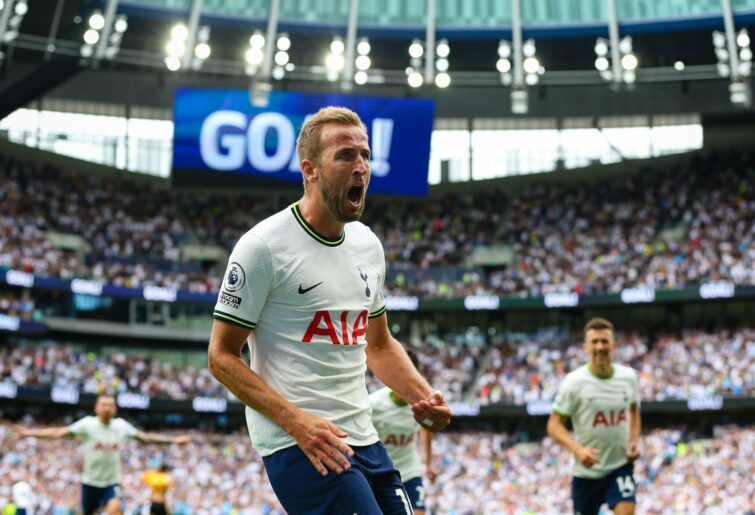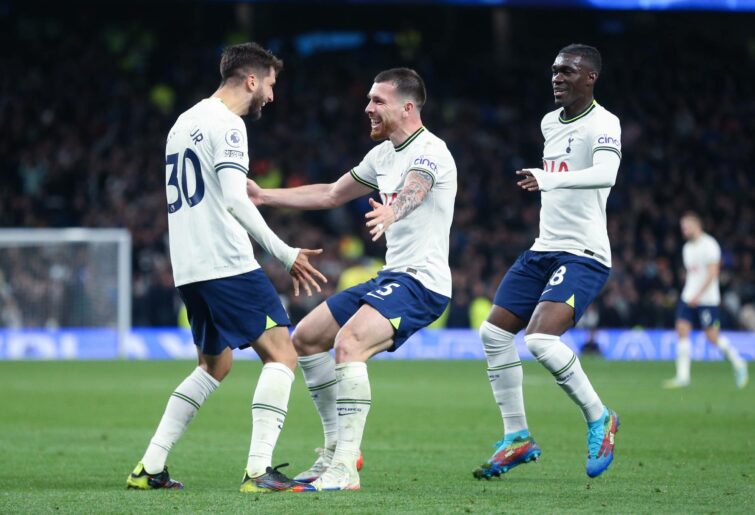'In the title race': Ambitious Ange outlines big goals for Spurs in next year's Premier League campaign
This time next year, Ange Postecoglou expects Tottenham to be in the Premier League title race.
Opinion
Sunday evening in North London is shaping up to be an exciting and potentially season-defining English Premier League match.
Tottenham Hotspur will be hosting league leaders and fierce rivals Arsenal in the North London Derby. A win for Spurs will keep them in touch with Champions League qualification for next season, while a loss will leave them outside of the top four and 14 points adrift of the impressive Gunners.
Tottenham’s captain, the talismanic Harry Kane, also sits one goal behind the club’s all-time leading goal scorer Jimmy Greaves (Kane: 265 goals, Greaves: 266 goals). Kane is also the all-time top scorer in North London Derby history with 14 goals.
The stage is set…
When Tottenham’s chairman Daniel Levy and his fellow Directors take their seats in the Directors’ Box on Sunday, their minds may be wandering elsewhere.
Reports emerged earlier this week that Tottenham Hotspur’s hierarchy had met with Qatar Sports Investments (QSI) in London for an introductory conversation.
Both parties have remained coy regarding what the discussions related to. However, it seems evident that discussions centred around the potential for QSI to acquire a minority stake in London’s third largest football club.
QSI is an investment body that operates on behalf of the Qatari government. QSI forms part of the Qatar Investment Authority, which is the state-run wealth fund of Qatar.
QSI is an active and extremely well-resourced investment organisation that has begun to invest in European football clubs.
In 2012, QSI purchased 100% ownership of France’s largest club, Paris Saint Germain (PSG). PSI also owns 22% of Portuguese club Braga (since October 2022). Braga currently sit second within Portugal’s top division.
Why would QSI be interested in purchasing a portion of Tottenham?
QSI is seeking to harness the momentum gained from the 2022 World Cup in Qatar to increase their investment portfolio across the European footballing landscape.
Recent middle eastern investment in the Premier League has proven lucrative, with this demonstrated via the City Football Group’s ownership of Manchester City. Manchester City have won four of the last five Premier League titles. The City Football Group is owned by the Abu Dhabi United Group (based in the United Arab Emirates).
Through their ownership of PSG, QSI have experienced that football clubs can attract strong financial rewards, particularly from TV rights revenue and sponsorship revenue.
The weakened economic conditions in the UK and current depreciation of the pound may also allow QSI to pay a lower fee for a minority stake in Tottenham.

(Photo by Craig Mercer/MB Media/Getty Images)
Firstly, the completion of Tottenham’s new stadium in 2019 has led to the club incurring significant debt, with the club reporting £706m of debt for the financial year ending 30 June 2021. New investment into the club would greatly assist in the repayment of this debt.
Tottenham’s weekend opponents, Arsenal, experienced similar debt issues post the construction and completion of their home ground, the Emirates Stadium in 2006.
Interestingly, Spurs current debt position is unknown, as they have not released their financial statements for the financial year ended 30 June 2022.
Secondly, Tottenham’s fanbase have recently shown frustration towards Levy. Spurs fans are tiresome of a perceived lack of player investment that has resulted in a lack of on field success. Spur’s last major trophy was the League Cup in 2008.
Levy has historically been characterised as a risk averse Chairman, who has driven hard bargains in historical transfer windows (most notably exemplified through Harry Kane’s failed transfer attempt to Manchester City in 2021).

(Photo by Rob Newell – CameraSport via Getty Images)
Additional investment would enable Tottenham to attract world class players through a higher transfer budget and greater wage thresholds. It would also prove vital in ensuring that Spur’s current crop of a-grade talent, such as Kane and Son Heung-min, remain committed to Tottenham for the long term.
In short, because the Union of European Football Associations (UEFA) would not allow them to purchase a majority stake (i.e., 50+% ownership). UEFA competition rules state that “no two clubs or more participating in a UEFA club competition may be directly or indirectly controlled by the same entity”.
As both PSG and Tottenham compete in the UEFA Champions League, QSI would be unable to be a majority owner of both clubs at the same time.
A minority stake ownership model would also allow QSI to be partial owners of several different clubs rather than the majority owner of just one club. This would allow QSI to acquire minority stakes in several clubs across Europe’s top leagues.
The 2021 takeover of Premier League club Newcastle United by the Saudi Arabian Public Investment Fund sparked fierce debate across the football community.
While some fans of Newcastle were overjoyed by their club’s new investment and increased spending power, others were concerned by potential links to the Saudi Arabian government.
This takeover was also a political minefield, with several UK politicians raising concerns over the potential ownership of English football clubs by state backed sovereign wealth funds.
This takeover took 18 months to be approved by the Premier League and involved the Premier League gaining legally binding assurances that the Saudi Arabian government would not control the club.
While only a potential minority stake, the Premier League would also require similar legally enforceable agreements to ensure that any QSI investment in Tottenham was legitimate and ethical.
The potential investment would also raise concerns from some English football fans who remain wary of the continued middle eastern investment in the English Premier League.